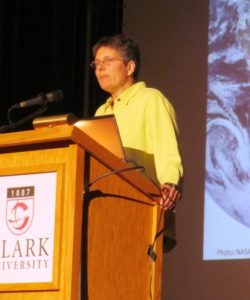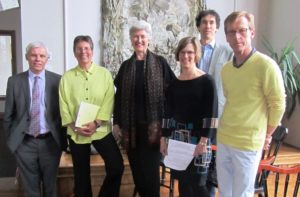
Don’t be fooled by Worcester’s brutal winter, Susanne Moser, Ph.D. ’97, told the audience in Atwood Hall. Our planet just experienced its warmest year on record, and the temperatures are rising. “Every single ecological and biological system on earth is seeing the impact of climate change” in unprecedented ways, Moser said. “There is no arguing with nature.”
Moser’s keynote address set the tone for the March 26 campus-wide Climate Change Teach-In at Clark University, which brought together faculty, students and other presenters and participants to grapple with the climate change crisis. The day featured more than 50 sessions that approached the subject from social, political, scientific and cultural perspectives.
In remarks prior to Moser’s presentation, Clark University President David Angel observed that we have become “stuck in the mud” when it comes to climate change, and “we need to bring the best of our intelligence, the best of our creativity, to try and find a way to become more unstuck.” He noted that local action is important, and that widespread change is “deeply rooted in individual communities.”

Moser, a climate change consultant who is a research fellow at the Woods Institute for the Environment at Stanford University, cautioned that the teach-in attendees would likely “be disturbed, grieving, maybe despairing” by the overwhelming scope of the problem, but also anticipated they would come away with a “sense of pulling together” to face the challenge.
Moser said the immense amount of carbon dioxide that human activity has released into the atmosphere since the Industrial Revolution has accelerated climate change at such an alarming rate that the environment can’t naturally filter it fast enough.
She asked for a show of hands of audience members who are under 40 years old, and then informed those with their hands in the air that half of all carbon emission released into the atmosphere from human activity since the beginning of the Industrial Revolution have occurred in the last 40 years. “We haven’t seen this in the experience of our species,” she said.
Moser said the Intergovernmental Panel on Climate Change (IPCC) points to “severe, pervasive and irreversible impacts” of climate change, and points to the dramatic decrease in ice cover at the earth’s poles. Global temperatures could rise by 7 to 9 degrees by 2100 if greenhouse gas emissions are unabated, she said.
Moser quoted one climate scientist who observed, “It’s too late to change anything. All we can do now is deal with the consequences.” Government in the past has risen to the occasion to face “impossible” challenges — to reach the moon, to enact the New Deal, to handle the energy crisis of the 1970s, Moser said.
But people-driven “bottom up” social movements and political revolutions also have the ability to transform, she said, noting that Congress has been inert on climate change. “We are absolutely essential in the fight to win this struggle,” she said, adding that there is no alternative. “We don’t have a planet B.”
Later in the day, Penn State ecologist Christopher Uhl described climate change as “earth’s response to our taking, taking, taking,” noting that per-capita consumption has tripled since the mid-1960s. He said that 2,000 scientists from 130 countries represented on the IPCC have reached the same conclusion: Climate change is unequivocal.
“How is it we are able to abuse earth as we are now doing?” Uhl asked. He answered the question by saying that it’s easy to abuse something you don’t respect; people have become “out of relationship” with the natural world and hence don’t consider its condition.
Uhl said we have separated ourselves from our emotions and from what he calls our “belly brain,” our gut instinct that allows us to harmonize with, rather than to control, the world around us. We are gradually severing ourselves from this “full-body intelligence,” as well as our sense of meaning and purpose,
Uhl insisted, and that phenomenon is reflected in our attitude toward the planet. “If you love Mother Earth like your own mother, you want to know everything about her … make her needs your own needs; grieve for her injuries. You want to protect her,” he said.
Throughout the day and across campus, participants engaged in vibrant discussions on myriad topics that explored the scientific underpinnings of climate change, the cultural representations of the altered environment, and the economic, social and political ramifications of a heating world.
In a session titled “Food and climate change/Justice from your plate to the planet,” geography professors Jody Emel and Dianne Rocheleau, a co-organizer of the Teach-In, with students Rebecca Miller ’15, Julia Groenfeldt ’15, Eli Goldman ’16 and Elliot Altbaum ’14, detailed how the factory farming system is affecting the environment.
“The greenhouse gas emissions from agriculture, forestry, and fisheries have nearly doubled in the past 50 years and could increase by an additional 30 percent by 2050,” Rocheleau said. “When we’re thinking about climate change, we should also be thinking about farmers, farming, and agriculture because it too has an impact that is not always realized.”
A campus-wide council session was held for an hour during the middle of the day as an opportunity to reflect and consider future actions. The council form of dialogue is used by the Council on the Uncertain Human Future.
Sarah Buie, senior associate at Clark’s Higgins School of Humanities and co-organizer of the Teach-In, summed up the gravity of the situation in an interview with the Worcester Telegram and Gazette. “This is the critical issue of our time,” she said. “Everything else depends on it.”
Video selections from the day’s events are available for viewing, as is a full list of organizers and sponsors.


